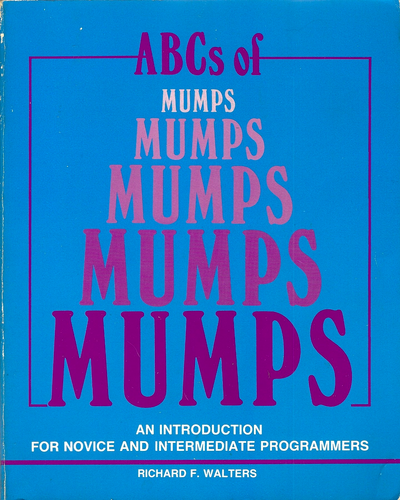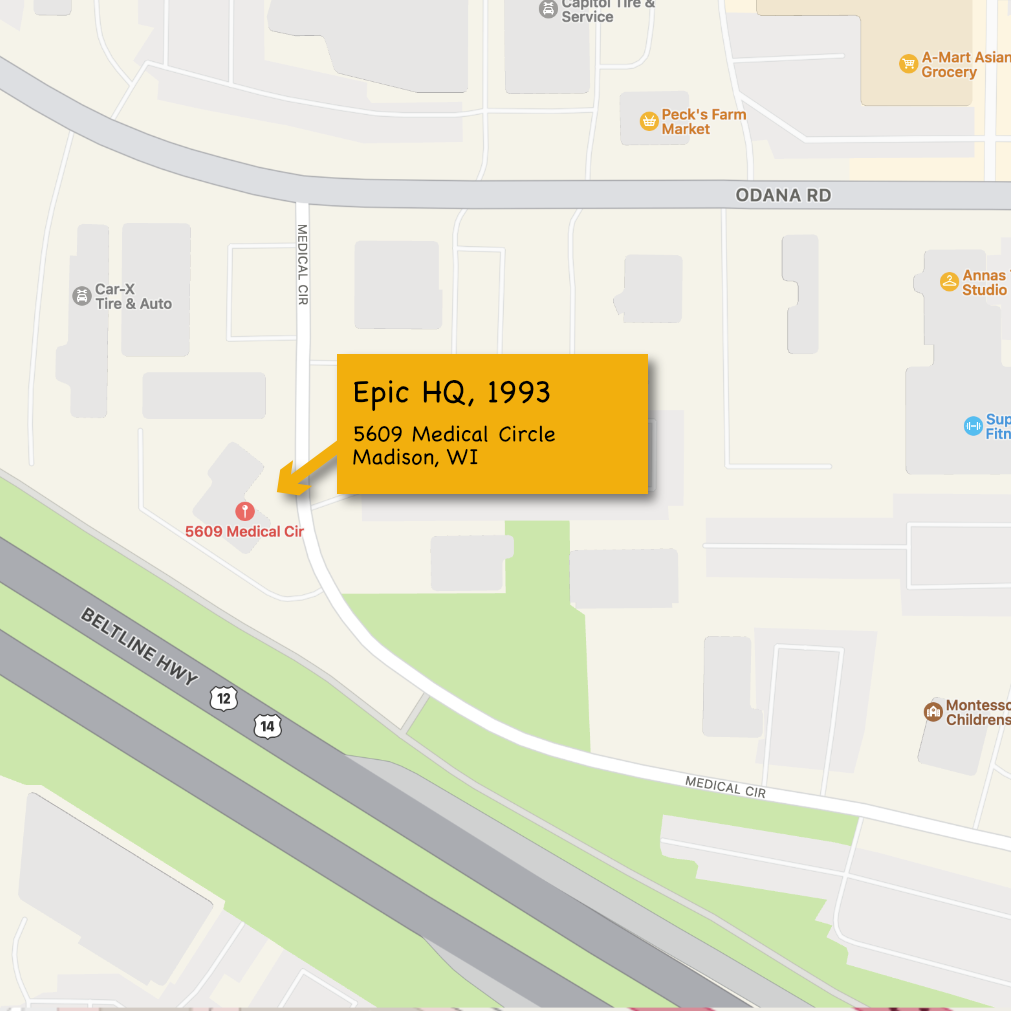Donuts on Day 1
My first day at Epic was August 23, 1993. A Monday. I don’t know why I’ve remembered that date so well over the years — it was my first full time job and I suppose that’s locked the date in my brain. Do others remember their start dates too?
It was a remarkable Monday at Epic. And not because I was starting. 😎 Never before had more than 2 people started on the same day. If you’ve seen Epic hiring days during the busy hiring years when 100+ would start on a single day, then 2 probably sounds ridiculous, downright impossible. But, in a company that had fewer than 40 people at the time, hiring 4 people was worthy of a big Note. I remember the names of the others that started still to this day even though I’ve not seen them in decades (I stayed a lot longer). Now that I think about it, the staff hired back in the 90s was quite different from a more modern Epic, and it wasn’t just because of the grunge style popular then.
On that day, I was the only new employee that had no full-time job experience prior to Epic. I was fresh out of college and still had that new-college smell. One of the new hires was placed into a customer facing support role, one was software development, and the other had a few roles that crossed areas. Epic hired software developers often fresh out of college, but not nearly as frequent in the 1990s. New college grads became more common at Epic as the number of job openings increased. In fact, it became rare to encounter someone with prior working experience in software development joining Epic. I do have a topic queued up to talk about the pros and cons of that hiring practice.
The first few hours of Day 1 are a bit hazy but I know there was some paperwork to sign, but not too much: healthcare, confidentiality agreements, employment agreements, etc. We didn’t have ID cards or anything of the sort. Weirdly, I was hoping for a badge as that was going to be a “right of passage” for me. I can’t recall whether we had actual keys to get in … I think we were given keys. The basement of the building had a dentist’s office and a secondary door which was locked, preventing patients of the dentist from making an unexpected visit. The front door was always open during business hours.
Donuts 🍩
Even back in 1993, Epic had the concept of a team mentor that would provide some guidance during the orientation period of employment. I’m sure I met my mentor early in the day — and then we went to gather a donut. One of the long traditions at Epic through the early 2010s or so was on an official hiring day that donuts would be supplied for all employees. The idea was that the donut feeding area would be a gathering place for the new hires to meet existing existing staff and start the day off with some sugared goodness. We hung around in the kitchen for 15-20 minutes and met some staff that way while I enjoyed my (probably) fruit or chocolate cake donut (my first choice when available).
Admittedly in practice, even back then, there wasn’t much donut eating & mingling going on, but the idea was sound. Usually people headed to the kitchen and grabbed a donut and ran back to their offices. No one complained loudly about free donuts. Seriously. (I think there were occasionally bagels too for the non-donut lovers).
Meet My Team
I started on Cohort. Cohort is one of the few Epic applications that was officially put out to the Midwest pasture (AKA sunset or retired). Some portion of its code base lived on in Epic Lab, later to become known as Epic Beaker. Cohort however had an unusually limited market, as it was specifically designed and built for (USA/Canada) public health laboratory systems (of which there was one in each state of the USA and provinces of Canada). So, maximum number of customers: 60 +/-. At the time I joined, there were 4 customers. And, now there were 4 employees on Cohort. There had recently been two departures from the team, so I and a customer facing employee were the shiny replacements.
My TL by the way was the same Epic employee that I’d told: “I just want a job.”
I do wish I had a screen shot of a workflow of Cohort, but given the era it was created and the privacy controls Epic has around it’s software and screenshots for decades, I’m not surprised I cannot dig one up. You’ll need to use your imagination — 80 characters wide x 25 characters tall. Lots of text, some ASCII art lines, and a square blinking cursor. It was a terminal based application. For those of you that occasionally dabble using modern terminal based applications, you should have a good sense of what it was.
Not Much for Day 1
Epic did have a basic training plan for new employees and it shared some content with customer facing technical training. My training would start later due to scheduling issues with the upcoming Epic User Group Meeting that was going to be held in about 2 weeks from my start date. I’ll talk more about that later.
Epic employees that started before the Verona campus did not have a cafeteria available. So, what had been tradition even back in the early nineties was that each day someone would pick a restaurant from a folder of places that could deliver and employees would write down what they wanted and leave the money. Someone would call it in later and announce when the food arrived. Epic paid for my first day’s meal — I have no recollection of what it was that we ate that day. Regardless, it was a smart way to keep staff in the building working more and offer a variety of food options during the week.
The Afternoon
My TL gave me the ABCs of MUMPS programming that I mentioned in a prior post and said: “read and learn this.” My mentor and TL would review some coding exercises (named appropriately: A, B, and C). Additionally, she scheduled some time to start to teach some of what a ‘public health lab system’ was and how the software worked both from a programming perspective, but also from the end user perspective.
My Terminal
Few Epic employees started BEFORE everyone had a personal computer or laptop. My first “Epic” computer was a dumb character-oriented terminal (I don’t remember the models, maybe an ex-Epic from that era remembers and could provide that detail). It wasn’t actually a green screen as far as I recall, it was amber. But, you get the idea. Glowing CRT text on a dark screen. Although, it was one of the fancier terminals as it had TWO connections it could maintain to distinct server connections. Two! The licenses and the server resources were limited though, so if you weren’t using a connection to a server, you’d release it.
I realize that many of you have never experienced first-hand a CRT terminal. While you may have used a LCD terminal, or even a CRT monitor displaying a terminal, it’s just not quite the same as low resolution CRT computer terminal and its glowing text (and the ). I sit here typing this on a 4K monitor display — and I don’t miss the glowing text. 😉
This Introvert’s Nightmare: The Overhead Page
If you needed a server resource and didn’t want to wait … ugh. An introvert’s nightmare…all-building paging system and say, I kid you not:: You’d grab your desk phone’s handset, tap a few keys to activate the
“Paging a COMPUTER_NAME line, paging a COMPUTER_NAME line.”
For example, one of the early servers that Cohort developers would use was called Quark. So, I’d need to announce: “Paging a Quark line.” Everyone’s phone would make the announcement immediately. It was so nerve wracking and I hated doing it. I did not grow more comfortable with that task and was very thankful for the era where that became uncommon and unnecessary.
The Simple Script
While there was a basic new employee orientation script for teams to follow, it wasn’t complicated or lengthy:
- Learn MUMPS/M
- Learn Chronicles (Epic database system)
- Learn your application
- Learn other responsibilities needed by your team (I’ll talk more about how broad this was back then)
- Learn “Epic” through a few courses taught by various staff. Judy taught one called “Philosophy of Epic”
I’ll talk more about these though in later posts as this was just Day 1 with Donuts.
Donut Science
Oh my the Science section of Wikipedia’s article on Donuts is thorough.
Questions for you
What was your first day like at your first full time job in your current career? What’s your favorite donut / doughnut? Write me! I want to know! 🍩💖



